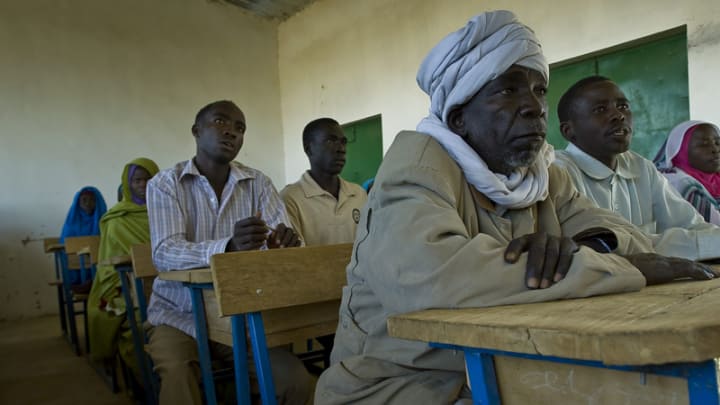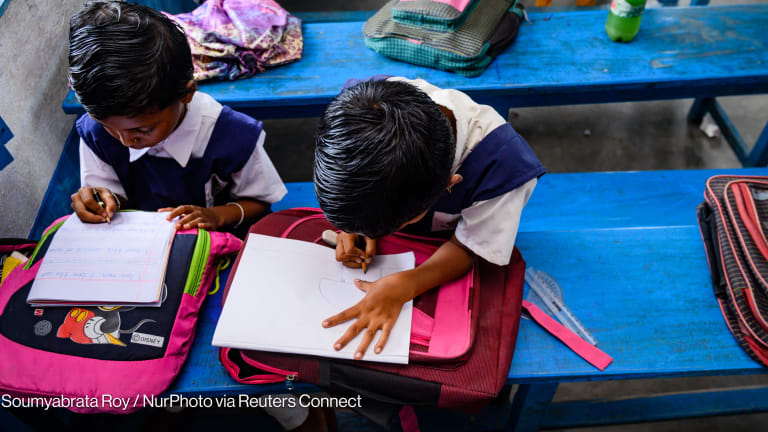
Being illiterate is like wearing unseen shackles. It not only limits an individual’s ability to escape poverty and reach their full potential, it also limits a person’s ability to stand up for and advocate for one’s self.
And yet more than 780 million adults (age 15 and over) globally still lack basic reading and writing skills. Women account for nearly two-thirds of illiterate adults. Youth literacy statistics are not much more inspiring: Approximately 126 million aged 15-24 are still unable to read worldwide, accounting for 10.6 percent of the global youth population.
While the international community has made great strides in promoting global literacy in the past 15 years, significant challenges remain.
To address these challenges, Pearson convened a coalition of global and national organizations in 2015 to identify and advance best practices and innovations, and to raise awareness and mobilize action for literacy. Project Literacy is now a coalition of more than 80 partners including Worldreader, National Literacy Trust, Too Small To Fail, Jumpstart, UNESCO and GOOD.
Understanding the current landscape of the global literacy sector is critical to maximizing the likelihood of success. In 2015, Results for Development completed a landscape analysis of the sector, published in 2016. The analysis led to five recommendations to support progress:
1. Increase support for gaps in the literacy sector, in particular for adult literacy and parental/community engagement.
One of the key takeaways from this landscape analysis is the lack of programming and funding for adult literacy in contrast to child literacy. Adult literacy, in particular maternal and women’s adult literacy, is extremely underfunded and in significant need of additional resources and attention.
Other critical issues currently undersupported by existing initiatives include literacy in emergencies — such as fragile states and refugee populations — advocacy for literacy at the grass-roots level and capacity building for national literacy organizations. Important literacy issues with some initial support — but where more could be done — include literacy for children with disabilities and parental engagement strategies for improving children’s literacy.
2. If a new global literacy campaign is launched, it should be inclusive and have a clear and targeted focus.
One of the questions this landscape analysis set out to answer was whether there is demand for a new global literacy campaign, and if so, how such a campaign could have the greatest impact and value. The majority of interviewed stakeholders noted that they see value in a new global literacy campaign, provided it met certain criteria like ensuring the inclusion of stakeholders at all levels, particularly representation from grassroots stakeholders in developing countries. Several stakeholders emphasized the importance of identifying a clear, narrow focus and objective for any new global literacy initiative, as well as the need to focus on action and implementation. The importance of credible leadership was also underscored.
3. Avoid duplication of effort, build on existing initiatives, and enhance information-sharing.
As existing initiatives in the literacy sector seek to expand their activities, or as new initiatives seek to enter the space, it is critically important to understand the scope of what has already been done in certain areas, and to build on these efforts where possible.
4. Enhance collaboration between private and public literacy stakeholders.
This landscape analysis underscored the relatively fragmented nature of the literacy landscape and the divide between private sector and nonprofits or public initiatives. With an increasing number of corporate stakeholders interested in playing a meaningful role in supporting literacy, the field as a whole could stand to benefit from greater collaboration and engagement across sectors.
5. Invest in robust monitoring, evaluation and learning — and the use of evidence to inform action.
While the evidence base for interventions seeking to improve literacy outcomes is growing, significant gaps remain. Literacy donors should continue to invest heavily in rigorous monitoring, evaluation, and learning efforts, to increase our collective understanding of best practice for improving literacy outcomes in different contexts for different target groups. Relatively strong evidence exists supporting the positive impact of mother-tongue instruction and differentiated instruction on literacy and learning outcomes. But more evidence from developing countries is needed for areas like these as well as education technology and distance learning, which has attracted considerable interest and funding.
Join the Devex community and access more in-depth analysis, breaking news and business advice — and a host of other services — on international development, humanitarian aid and global health.





